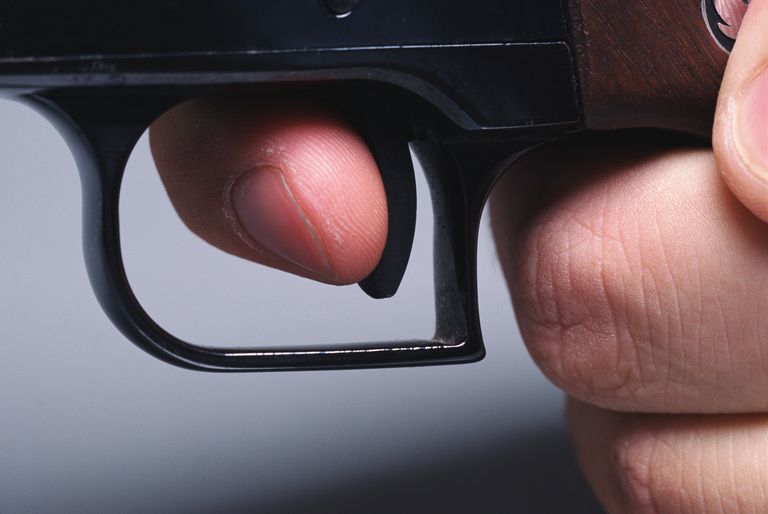 Being convicted of any criminal offense can put you in jeopardy of spending time in jail or prison as well as facing the repercussion of being a convicted criminal. Certain offenses, however, make it more likely that you will be incarcerated and face significant non-judicial consequences. Offenses that involve firearms, for example, often carry some of the most severe penalties. Because firearm laws are partially governed by state law, laws involving firearms can vary from one state to another. To help you refrain from unintentionally violating one of Nebraska’s laws, an Omaha violent crime attorney explains some of the more important and relevant Nebraska firearms laws.
Being convicted of any criminal offense can put you in jeopardy of spending time in jail or prison as well as facing the repercussion of being a convicted criminal. Certain offenses, however, make it more likely that you will be incarcerated and face significant non-judicial consequences. Offenses that involve firearms, for example, often carry some of the most severe penalties. Because firearm laws are partially governed by state law, laws involving firearms can vary from one state to another. To help you refrain from unintentionally violating one of Nebraska’s laws, an Omaha violent crime attorney explains some of the more important and relevant Nebraska firearms laws.
Definitions
Definitions are often critical to understanding the law. With that in mind, the following definitions may be helpful:
- Firearm — any weapon which is designed to or may readily be converted to expel any projectile by the action of an explosive or frame or receiver of any such weapon.
- Handgun — any firearm with a barrel less than sixteen inches in length or any firearm designed to be held and fired by the use of a single hand.
- Antique handgun or pistol — To qualify as antique, handguns or pistols must have been made before 1898 or be a replica of an antique handgun or pistol made before 1898. If a replica, the guns must be designed so as to be unable to fire modern ammunition.
- Machine gun — any firearm, regardless of size and designation, which by a single pull of the trigger, shoots automatically more than one shot without manual reloading.
- Short rifle — a rifle whose barrel is less than 16 inches long or whose overall length is less than 26 inches.
- Short shotgun – a shotgun whose barrel or barrels measure less than 18 inches long or whose overall length is less than 26 inches.
Purchasing a Firearm and Background Checks
The federal Brady Act of 1993 created the National Instant Criminal Background Check System (NCIS) to be used to conduct a background check when someone wishes to purchase a firearm. States may use their own system instead if it has been approved by the ATF. Nebraska has a split system for authorizing firearms transactions, having developed an alternative permit system for the sale of handguns. Private transactions are exempt from the background check and record-keeping requirements. Common ways to violate the background check laws include:
- Providing false information on an application
- Causing a background check to be run for a purpose other than the purchase of a firearm.
- Selling a firearm without doing a background check (if required)
- Purchasing a firearm for someone who is known to be prohibited from purchasing/owning a firearm
Carrying a Handgun – Conceal Carry Laws
Nebraska law does not prohibit openly carrying a firearm. If any part of the handgun is showing it is not concealed and a permit is not required. To carry a handgun concealed, however, you must have a permit. To qualify for a permit, you must not have a felony conviction nor a conviction for a misdemeanor crime of violence within the last 10 years and you must not be mentally unstable. You must also complete the required training. Carrying a concealed weapon without the proper permit is a Class I misdemeanor upon the first conviction and a Class IV felony for subsequent convictions.
Additional Laws
Possession of a firearm while committing a drug-related offense — Knowingly or intentionally possessing a firearm while in violation of the state’s narcotics laws subjects one to being punished by the next higher penalty classification.
Possession of prohibited firearms — Possession of a machine gun, short rifle, or short shotgun is a Class IV felony unless you are a law enforcement officer or are in the military.
Underage firearms laws – possession of a handgun under 18, unless under the supervision of a parent or guardian, a Class I misdemeanor. Selling, or transferring, a handgun to a minor is a Class III felony.
Firearms at school — possessing a firearm in a school, on school grounds, in a school-owned vehicle, or at a school-sponsored activity or athletic event is a Class IV felony.
Firearms and felonies — using a firearm to commit a felony is a Class IC felony itself, and possessing a firearm during the commission of a felony is a Class II felony.
Contact an Omaha Violent Crime Attorney at Petersen Law Office
If you have been charged with a violent crime in the State of Nebraska, consult with an experienced Nebraska criminal attorney as soon as possible to ensure that your rights are protected. In Nebraska contact Petersen Criminal Defense Law 24 hours a day at 402-509-8070 to discuss your case.


